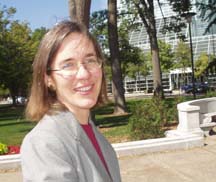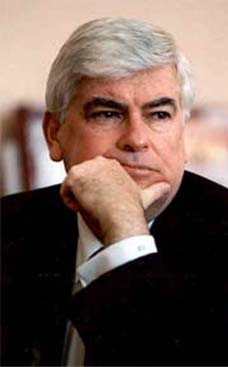2007.01.24: January 24, 2007: Headlines: Figures: COS - Cameroon: Journalism: Speaking Out: Environment: Global Warming: Capital times: Margaret Krome writes: Corporate push welcome to get action on climate
Peace Corps Online:
Directory:
Cameroon:
Special Reports: Cameroon RPCV and Columnist Margaret Krome:
2007.01.24: January 24, 2007: Headlines: Figures: COS - Cameroon: Journalism: Speaking Out: Environment: Global Warming: Capital times: Margaret Krome writes: Corporate push welcome to get action on climate
Margaret Krome writes: Corporate push welcome to get action on climate

"Virtually no credible scientific argument remains regarding the reality of climate change. What we don't know, scientifically or politically, is what corrective measures are needed. With well-buffered and interactive systems, what are the tipping points, and what measures can reverse them? What is the time lag between cause and effect, between course correction and system recovery? If the prescriptions for solutions still remain unclear, as always in the face of uncertainty, the precautionary principle should apply. This principle states that if an action or policy might cause severe or irreversible harm to the public, in the absence of a scientific consensus that harm would not ensue, the burden of proof falls on those who would advocate taking the action. In this case, the burden falls on those who favor inaction, which is almost certain to cause irreparable harm to the planet." Journalist Margaret Krome served as a Peace Corps Volunteer in Cameroon.
Margaret Krome writes: Corporate push welcome to get action on climate
Margaret Krome: Corporate push welcome to get action on climate
By Margaret Krome, January 24, 2007
Earlier this week, 10 of the nation's largest corporations joined with major environmental groups to press President Bush for more aggressive action on climate change.
The group, known as the United States Climate Action Partnership, calls for mandatory carbon emission reductions, discourages construction of new coal-fired plants and advocates a market-based emissions trading program.
This unexpected collaboration should embolden Congress to take bold action as well.
Six years ago, President Bush became internationally known for a head-in-the-sand approach to climate change when he expressed doubts about the scientific evidence of its existence and refused to sign the Kyoto Protocol on climate change. When Vice President Cheney held a meeting with energy leaders that excluded environmentalists, many perceived the administration's position as being driven by corporate interests.
Even in 2001, however, the administration described its tepid efforts as "an ambitious strategy" containing "several bold initiatives that incorporate scientific research, technological innovation, international cooperation to reduce greenhouse gas emissions while strengthening the economy."
Given this history of describing inaction and obstruction as bold leadership, it is no fluke that the partnership announced its agenda a day before the president's State of the Union address, in which he was expected to call for voluntary emissions caps and technological solutions.
What has changed since 2001 to reverse the direction of pressure between corporate leaders and the president?
For one thing, scientific evidence has mounted. Next week a climate change report will be released that was written by more than 600 scientists and reviewed by another 600 experts in 154 countries. Early reviewers say that the 1,600-page document offers incontrovertible evidence, if any more is needed, of global climate change.
There is also growing public concern about climate change, with 54 percent of U.S. citizens polled recently disapproving of Bush's stance on global warming. Even the religious right is incorporating this issue into its agenda.
This shift is growing as people experience climate change in their own lives. Last week as our family vacationed in Puerto Rico, we saw damaged coral reefs, which many experts attribute in part to climate change.
Virtually no credible scientific argument remains regarding the reality of climate change. What we don't know, scientifically or politically, is what corrective measures are needed.
With well-buffered and interactive systems, what are the tipping points, and what measures can reverse them?
What is the time lag between cause and effect, between course correction and system recovery?
If the prescriptions for solutions still remain unclear, as always in the face of uncertainty, the precautionary principle should apply. This principle states that if an action or policy might cause severe or irreversible harm to the public, in the absence of a scientific consensus that harm would not ensue, the burden of proof falls on those who would advocate taking the action. In this case, the burden falls on those who favor inaction, which is almost certain to cause irreparable harm to the planet.
A cynic could note that most companies in the partnership, including Alcoa, Duke Energy, General Electric, DuPont, Caterpillar and others, are so positioned that the measures they propose will harm them less than competitors, who may depend more on coal-fired energy, manufacture emissions-spewing vehicles or otherwise be unable to adapt.
But many companies find that by reducing emissions they are actually saving materials in the form of wasted oil, paint, fuels and other materials, and that a better manufacturing process can save tremendous dollars.
Congressional Democrats have announced plans to tackle climate change. It will be a contentious fight, with opposition to meaningful corrections coming from automobile manufacturers, airlines, labor and many other sectors. It is encouraging to have some of the nation's most powerful companies, whatever their motives, fighting for real policy change.
Margaret Krome is a Madison resident who writes this column every other week. E-mail: mkrome@inxpress.net
Published: January 24, 2007
Links to Related Topics (Tags):
Headlines: January, 2007; RPCV Margaret Krome (Cameroon); Figures; Peace Corps Cameroon; Directory of Cameroon RPCVs; Messages and Announcements for Cameroon RPCVs; Journalism; Speaking Out; Environment; Global Warming; Wisconsin
When this story was posted in February 2007, this was on the front page of PCOL:





Peace Corps Online The Independent News Forum serving Returned Peace Corps Volunteers
 | Ron Tschetter in Morocco and Jordan
On his first official trip since being confirmed as Peace Corps Director, Ron Tschetter (shown at left with PCV Tia Tucker) is on a ten day trip to Morocco and Jordan. Traveling with his wife (Both are RPCVs.), Tschetter met with volunteers in Morocco working in environment, youth development, health, and small business development. He began his trip to Jordan by meeting with His Majesty King Abdullah II and Her Majesty Queen Rania Al Abdullah and discussed expanding the program there in the near future. |
 | Chris Dodd's Vision for the Peace Corps
Senator Chris Dodd (RPCV Dominican Republic) spoke at the ceremony for this year's Shriver Award and elaborated on issues he raised at Ron Tschetter's hearings. Dodd plans to introduce legislation that may include: setting aside a portion of Peace Corps' budget as seed money for demonstration projects and third goal activities (after adjusting the annual budget upward to accommodate the added expense), more volunteer input into Peace Corps operations, removing medical, healthcare and tax impediments that discourage older volunteers, providing more transparency in the medical screening and appeals process, a more comprehensive health safety net for recently-returned volunteers, and authorizing volunteers to accept, under certain circumstances, private donations to support their development projects. He plans to circulate draft legislation for review to members of the Peace Corps community and welcomes RPCV comments. |
 | He served with honor
One year ago, Staff Sgt. Robert J. Paul (RPCV Kenya) carried on an ongoing dialog on this website on the military and the peace corps and his role as a member of a Civil Affairs Team in Iraq and Afghanistan. We have just received a report that Sargeant Paul has been killed by a car bomb in Kabul. Words cannot express our feeling of loss for this tremendous injury to the entire RPCV community. Most of us didn't know him personally but we knew him from his words. Our thoughts go out to his family and friends. He was one of ours and he served with honor. |
 | Peace Corps' Screening and Medical Clearance
The purpose of Peace Corps' screening and medical clearance process is to ensure safe accommodation for applicants and minimize undue risk exposure for volunteers to allow PCVS to complete their service without compromising their entry health status. To further these goals, PCOL has obtained a copy of the Peace Corps Screening Guidelines Manual through the Freedom of Information Act (FOIA) and has posted it in the "Peace Corps Library." Applicants and Medical Professionals (especially those who have already served as volunteers) are urged to review the guidelines and leave their comments and suggestions. Then read the story of one RPCV's journey through medical screening and his suggestions for changes to the process. |
 | The Peace Corps is "fashionable" again
The LA Times says that "the Peace Corps is booming again and "It's hard to know exactly what's behind the resurgence." PCOL Comment: Since the founding of the Peace Corps 45 years ago, Americans have answered Kennedy's call: "Ask not what your country can do for you--ask what you can do for your country. My fellow citizens of the world: ask not what America will do for you, but what together we can do for the freedom of man." Over 182,000 have served. Another 200,000 have applied and been unable to serve because of lack of Congressional funding. The Peace Corps has never gone out of fashion. It's Congress that hasn't been keeping pace. |
 | PCOL readership increases 100%
Monthly readership on "Peace Corps Online" has increased in the past twelve months to 350,000 visitors - over eleven thousand every day - a 100% increase since this time last year. Thanks again, RPCVs and Friends of the Peace Corps, for making PCOL your source of information for the Peace Corps community. And thanks for supporting the Peace Corps Library and History of the Peace Corps. Stay tuned, the best is yet to come. |
 | History of the Peace Corps
PCOL is proud to announce that Phase One of the "History of the Peace Corps" is now available online. This installment includes over 5,000 pages of primary source documents from the archives of the Peace Corps including every issue of "Peace Corps News," "Peace Corps Times," "Peace Corps Volunteer," "Action Update," and every annual report of the Peace Corps to Congress since 1961. "Ask Not" is an ongoing project. Read how you can help. |
Read the stories and leave your comments.

Some postings on Peace Corps Online are provided to the individual members of this group without permission of the copyright owner for the non-profit purposes of criticism, comment, education, scholarship, and research under the "Fair Use" provisions of U.S. Government copyright laws and they may not be distributed further without permission of the copyright owner. Peace Corps Online does not vouch for the accuracy of the content of the postings, which is the sole responsibility of the copyright holder.
Story Source: Capital times
This story has been posted in the following forums: : Headlines; Figures; COS - Cameroon; Journalism; Speaking Out; Environment; Global Warming
PCOL36044
13



















